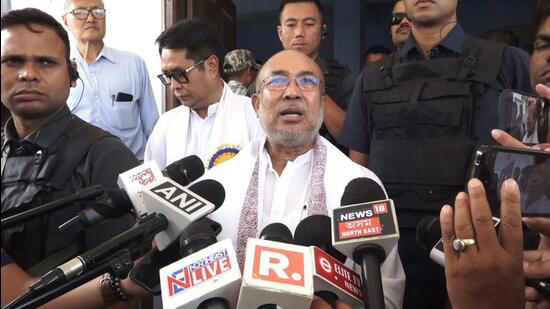Chief Minister N. Biren Singh revealed that the recent arrest of a Myanmar national suggests foreign involvement in the state’s conflict. The arrest, which was made as part of a broader crackdown on violent activities and smuggling operations along the India-Myanmar border, has shed light on external forces potentially fueling the ethnic tensions that have plagued the region for months. According to CM Singh, this development underscores the importance of addressing the cross-border factors contributing to the prolonged crisis in Manipur.
The Arrest: A Myanmar National with Suspicious Links
Manipur has been experiencing intense ethnic violence between the Meitei and Kuki-Zo communities since May 2023. The recent arrest of a Myanmar national has further complicated the already tense situation. The individual, whose identity has not been officially disclosed, was apprehended in connection with illegal smuggling operations. According to initial reports, the suspect was found to be in possession of arms and narcotics, indicating his involvement in illicit cross-border trade.
During the interrogation, it became apparent that the individual had close ties with armed groups in Myanmar and may have played a role in supplying weapons and resources to factions involved in the Manipur unrest. The arrest has led local authorities to believe that Myanmar-based elements have been actively involved in fanning the flames of violence in the region, thereby exacerbating the conflict.
In a press conference, Chief Minister N. Biren Singh expressed deep concern over the infiltration of foreign actors into the Manipur crisis. “The arrest of the Myanmar national is a clear indication that foreign elements are involved in destabilizing the state. The presence of cross-border smuggling and the inflow of illegal arms are serious issues that cannot be ignored,” Singh said.
Cross-Border Dynamics and Ethnic Tensions
Manipur shares a porous border with Myanmar, making it susceptible to illegal cross-border activities, including drug trafficking and arms smuggling. The state has long struggled with the challenges posed by insurgent groups, both local and foreign, operating in the border areas. These groups, often linked to Myanmar-based militant organizations, have exploited the region’s instability to carry out their activities.
The Kuki-Zo community, one of the ethnic groups involved in the current unrest, has historical and cultural ties with the Chin people of Myanmar, leading to speculation that the conflict has a transnational dimension. The recent arrest has bolstered this theory, with many analysts suggesting that foreign militant groups may be taking advantage of these ethnic links to influence the situation in Manipur.
Chief Minister Biren Singh pointed out that the free movement of people across the India-Myanmar border under the Free Movement Regime (FMR) has often been exploited by insurgents and smugglers, making it difficult to control the inflow of arms and drugs into Manipur. “The arrest is a wake-up call for us to reassess the security situation along the border. We need to strengthen border controls and coordinate more closely with central security forces,” Singh added.
Addressing the Root Causes of the Conflict
The ethnic violence in Manipur has claimed hundreds of lives and displaced thousands since it erupted in May 2023. The conflict primarily involves the Meitei, who are the majority in the Imphal Valley, and the Kuki-Zo communities, who inhabit the surrounding hill districts. Tensions over land rights, political representation, and ethnic identity have fueled the violence, with both sides accusing each other of instigating attacks.
The arrest of the Myanmar national has reignited concerns about the role of external actors in aggravating these tensions. While the ethnic conflict has deep-rooted local causes, CM Biren Singh stressed that the involvement of foreign elements could escalate the situation further if not addressed promptly. He urged the central government to provide additional support to state authorities in curbing cross-border smuggling and insurgency activities.
“The ethnic conflict is a complex issue, but the presence of foreign influence adds another dangerous layer to it. We need to focus not only on resolving internal issues but also on securing our borders and preventing foreign elements from taking advantage of the unrest in Manipur,” Singh said.
Moving Forward: Strengthening Security Measures
In light of this new revelation, the Manipur government is expected to take stronger measures to secure its borders and counter the influence of foreign actors. CM Biren Singh announced that the state government, in collaboration with central security forces, would intensify operations against smuggling networks and insurgent groups operating along the India-Myanmar border. Enhanced surveillance, intelligence-sharing, and stricter enforcement of border controls will be key components of this effort.
Singh also called for greater cooperation with Myanmar’s government to address the cross-border challenges. “We are facing a serious situation that requires a coordinated response. We will work closely with the central government and our neighbors to ensure that the security of Manipur is not compromised,” he stated.
The arrest of a Myanmar national with alleged links to the Manipur crisis highlights the growing involvement of foreign elements in the state’s conflict. As the situation in Manipur remains tense, Chief Minister Biren Singh’s revelations about cross-border influences underline the need for stronger security measures and international cooperation to restore peace and stability in the region. The government now faces the dual challenge of addressing internal ethnic tensions while preventing foreign actors from further destabilizing the state.

